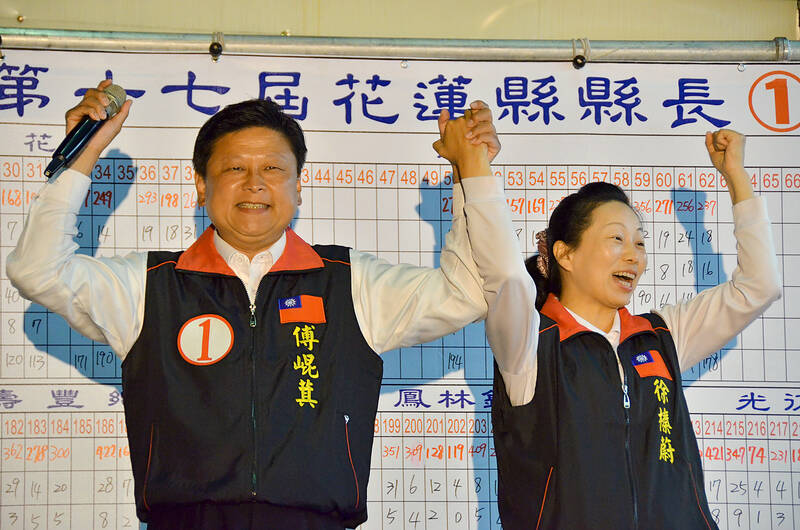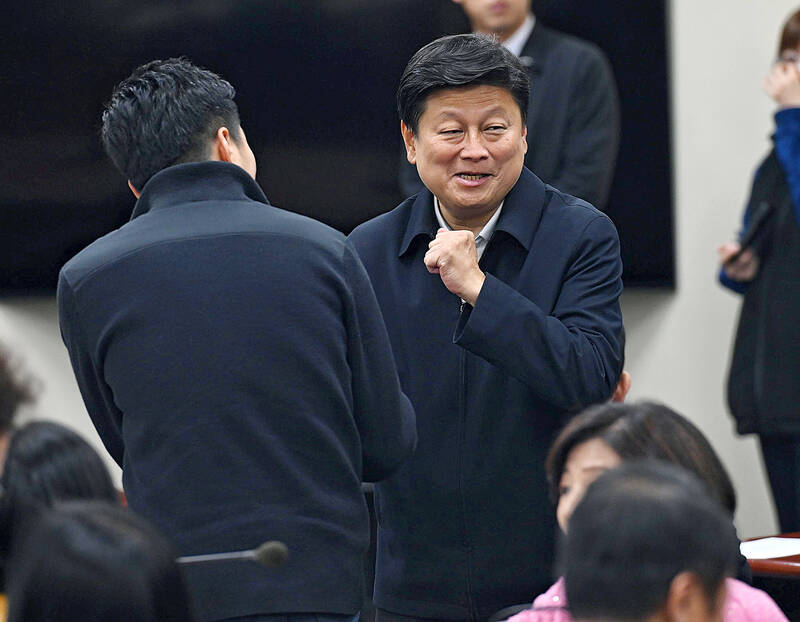Fu Kun-chi (傅崐萁) — known as the “King of Hualien” — is a larger-than-life figure. He is outrageous, ostentatious and brazen. He has been jailed multiple times for financial crimes and is the target of so many ongoing investigations it is hard to keep count.
He is so controversial that the Chinese Nationalist Party (KMT) kicked him out of the party in 2009 for running as an independent against their own nominated candidate for Hualien County commissioner and his extensive legal troubles, only to welcome him back to the party six months after finishing his latest jail term in 2021.
Today, he is the powerful and combative KMT legislative caucus convener, spearheading the legislative agenda that gave rise to the Bluebird Movement (青鳥行動) in May last year.

Photo: Yang Yi-chung, Taipei Times
The civil society groups spawned from that movement, currently leading the recall campaigns, hate him above all others. His recall is by far the one drawing the most attention, and volunteers from around the country are flocking to Hualien to try to join the campaign.
LORD OF THE WATERS
Fu is one of the most powerful KMT local patronage faction leaders, possibly the second most powerful after the Yunlin Chang (張) clan led by former county commissioner Chang Jung-wei (張榮味), or third after Yen Ching-piao’s (顏清標) Taichung Black Faction. For a look at the recent evolution of the factions, check out part three of this periodic series (“Factions taking over the KMT, and growing in the DPP” April 15, page 12).

Photo: Chang Chia-ming, Taipei Times
He is a character right out of the heyday of 1990s factional politicians, and with the now elderly Yen having put his gun-toting and womanizing days behind him, Fu is the biggest old-school figure strutting the stage. He has a swaggering, swashbuckling mentality, and his brazen flaunting of his wealth and gaudy mansion is straight out of that era. Part two of this series explores that era (“The battle between the KMT factions and party elites in the lawless era” April 8, page 12).
Despite being almost a caricature of the prototypical factional pol, he is also a curious anomaly whose background is atypical. Part one examines the formation of the factions (“Witnessing the early era of the KMT’s patronage factions” April 2, page 12).
The factions were formed by the KMT following their arrival in Taiwan to exercise control through local elites, carefully balancing and limiting competing factions to maintain party dominance.
Yet curiously, Fu is not from a traditional long-standing Taiwanese Hualien factional family, and is Hakka. He was born in Taichung when his father was in charge of public works and water management systems in central Taiwan for the now defunct Taiwan Provincial Government.
His father was promoted to housing and urban development for eastern Taiwan, and the family moved to Hualien in 1977 when Fu was a teenager.
By the late 1990s, Fu was clearly a big wheeler-dealer in Hualien. He was investigated on multiple charges of insider trading, some of which sent him to jail.
At some point between the late 1990s and early 2000s, he had so much control over irrigation in the county he had — as one account puts it — the ability to “freeze the water supply.”
What is unclear is exactly when and how he was able to exercise so much power, especially as an outsider not from a traditional factional family. Irrigation is one of the classic sources of patronage faction power, yet somehow Fu had managed to become the biggest, most influential of them all in Hualien while still in his thirties. How?
It is theoretically possible he managed it all on his own, but that seems unlikely. A more plausible scenario is he built on resources, knowledge and connections built by his father.
Taiwan was exceedingly corrupt at the time, and his father’s position was a powerful one. With his background in water management, it would not be surprising if the elder Fu saw the potential for power and influence that this critical resource offered in agricultural Hualien.
It would explain how Fu had the resources to become so powerful, so quickly. By all accounts, by the 2000s his influence over the irrigation and various agricultural associations was enormous, putting their ability to harness tens of thousands of votes within his influence.
While Fu wins most of the internal battles with Hualien’s pan-blue camp, his power is not absolute and other powerful figures and clans sometimes score wins. This is different than the Yunlin Chang clan, who largely own the pan-blue camp, while opponents decamped to the Democratic Progressive Party (DPP) — though there are claims that the Changs have some allies even within the DPP.
RISING TO THE THRONE
In the 2000 presidential election, Fu supported then-independent candidate James Soong (宋楚瑜).
This is unsurprising. Previously, Soong as Taiwan provincial governor and rising KMT star had travelled the country making promises of development — especially in agriculture and irrigation underpinning the factions — that the provincial government could not possibly afford.
He then strong-armed the KMT national government into paying for his promises, much to the fury and embarrassment of then-president and KMT party chairman Lee Tung-hui (李登輝), who subsequently backed Lien Chan (連戰) over him as the party’s presidential candidate.
Soong subsequently formed the People’s First Party (PFP), and Fu won his first legislative seat in 2001 under the banner of the PFP. He won re-election twice as a PFP candidate before switching to the KMT to win again in 2009.
The same year he ran for Hualien County commissioner against the officially nominated KMT candidate, and won as an independent, winning re-election in 2014. He divorced his wife Hsu Chen-wei (徐榛蔚) to get around nepotism laws and appointed her deputy commissioner, but was later found guilty regardless, and he and his wife paid fines to avoid jail time.
In 2014, Hsu ran against Fu for county commissioner, also as an independent, but only got 3.5 percent of the vote. She remarried Fu in 2016.
Since the early 2000s, Fu faced many investigations. In some cases, he ran out of appeals and served several jail terms in the 2010s, resulting in him being removed from office as county commissioner in 2018, with only three months left in his term.
His wife won the next two terms and continues to be commissioner to this day, but will be term-limited out next year.
In 2019, former legislative speaker and Kaohsiung White Faction leader Wang Jin-pyng (王金平) embarked on a quiet campaign to forge the formerly rival factions into a unified force to fight off attempts by the DPP to nationalize irrigation and agricultural associations, a major threat to their existence. The DPP succeeded in nationalizing the irrigation associations, but it is unclear how much effect this has had on reducing local influence by the factions.
Fu, mindful that the DPP potentially threatened the source of his power, and other factions, became an enthusiastic supporter pushing Han Kuo-yu (韓國瑜) to run as the KMT candidate for president in 2020. Han is affiliated with the Yunlin Chang clan and would later become his rival in a bid to become legislative speaker.
By this point, he was nationally known, but not yet widely hated. He was an embarrassment, but others were arguably worse, such as Miaoli County Commissioner Chung Tung-chin (鍾東錦).
Though his background plays a role, his current status as enemy #1 and prime target for the recall campaigners is more about recent events, which we will examine next.
Donovan’s Deep Dives is a regular column by Courtney Donovan Smith (石東文) who writes in-depth analysis on everything about Taiwan’s political scene and geopolitics. Donovan is also the central Taiwan correspondent at ICRT FM100 Radio News, co-publisher of Compass Magazine, co-founder Taiwan Report (report.tw) and former chair of the Taichung American Chamber of Commerce. Follow him on X: @donovan_smith.

The Lee (李) family migrated to Taiwan in trickles many decades ago. Born in Myanmar, they are ethnically Chinese and their first language is Yunnanese, from China’s Yunnan Province. Today, they run a cozy little restaurant in Taipei’s student stomping ground, near National Taiwan University (NTU), serving up a daily pre-selected menu that pays homage to their blended Yunnan-Burmese heritage, where lemongrass and curry leaves sit beside century egg and pickled woodear mushrooms. Wu Yun (巫雲) is more akin to a family home that has set up tables and chairs and welcomed strangers to cozy up and share a meal

Dec. 8 to Dec. 14 Chang-Lee Te-ho (張李德和) had her father’s words etched into stone as her personal motto: “Even as a woman, you should master at least one art.” She went on to excel in seven — classical poetry, lyrical poetry, calligraphy, painting, music, chess and embroidery — and was also a respected educator, charity organizer and provincial assemblywoman. Among her many monikers was “Poetry Mother” (詩媽). While her father Lee Chao-yuan’s (李昭元) phrasing reflected the social norms of the 1890s, it was relatively progressive for the time. He personally taught Chang-Lee the Chinese classics until she entered public

Last week writer Wei Lingling (魏玲靈) unloaded a remarkably conventional pro-China column in the Wall Street Journal (“From Bush’s Rebuke to Trump’s Whisper: Navigating a Geopolitical Flashpoint,” Dec 2, 2025). Wei alleged that in a phone call, US President Donald Trump advised Japanese Prime Minister Sanae Takaichi not to provoke the People’s Republic of China (PRC) over Taiwan. Wei’s claim was categorically denied by Japanese government sources. Trump’s call to Takaichi, Wei said, was just like the moment in 2003 when former US president George Bush stood next to former Chinese premier Wen Jia-bao (溫家寶) and criticized former president Chen

President William Lai (賴清德) has proposed a NT$1.25 trillion (US$40 billion) special eight-year budget that intends to bolster Taiwan’s national defense, with a “T-Dome” plan to create “an unassailable Taiwan, safeguarded by innovation and technology” as its centerpiece. This is an interesting test for the Chinese Nationalist Party (KMT), and how they handle it will likely provide some answers as to where the party currently stands. Naturally, the Lai administration and his Democratic Progressive Party (DPP) are for it, as are the Americans. The Chinese Communist Party (CCP) is not. The interests and agendas of those three are clear, but